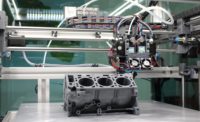INDUSTRY HEADLINE
ASTM International Additive Manufacturing Center of Excellence Announces First Round of R&D Projects

SINGAPORE — Global standards developer ASTM International announced its first round of funding to support research that will help catalyze the development of needed standards in additive manufacturing, also known as 3D printing.
This investment of $300,000 and in-kind contributions will help partners in the ASTM International Additive Manufacturing Center of Excellence address pressing technical information needs in this fast-growing area.
“We are very fortunate to work with such renowned organizations to leverage their expertise towards standardization in additive manufacturing,” said Matthew Donovan who chairs the research and innovation group under ASTM International’s additive manufacturing technology committee (F42), which held its biannual meeting in Singapore where this announcement was made. Donovan is a principal engineer at Oerlikon.
The initial round of projects approved by the committee target four main areas: feedstock, process qualification, post-processing, and testing. The projects are described below.
The UK-based Manufacturing Technology Centre (MTC) will conduct research aimed at developing quality assessment standards for metal powders used in additive-manufacturing machines. This feedstock-characterization research will contribute to a standard guide that helps people who need to evaluate powder quality and recyclability.
NASA will work to develop standard procedures, metrics, and comprehensive requirements to help qualify machines and processes in laser powder bed fusion (L-PBF). This process-qualification-and-assessment research aims to establish much-needed consensus in this area across the additive manufacturing community.
Applied technology developer EWI will research how various surface finishing techniques for additively-manufactured products impact performance and structural integrity. This post-processing research will help standardize surface quality and measurement metrics.
Auburn University will perform research on mechanical testing issues of metal additive manufacturing to better understand the relationships between the properties of test specimens and the performance of parts. This study will contribute to a standard that provides guidance on designing specimens (i.e., test coupons) that are most representative of additively-manufactured components.
In addition to these projects, the National Institute for Aviation Research (NIAR), the center’s first strategic partner, will focus on mechanical testing issues surrounding polymers (plastics) used in additive manufacturing. They will look to create guidelines and best practices aimed at applying existing mechanical testing methods to this fast-growing area.
The announcement of these projects was made by ASTM International’s director of global additive manufacturing programs, Dr. Mohsen Seifi. The F42 meeting was held in conjunction with an event organized by the Singapore Standards Council, the Singapore Manufacturing Federation, Standards Development Organization, and Singapore’s National Additive Manufacturing Innovation Cluster (NAMIC).
For more information, visit amcoe.org.
Looking for a reprint of this article?
From high-res PDFs to custom plaques, order your copy today!







